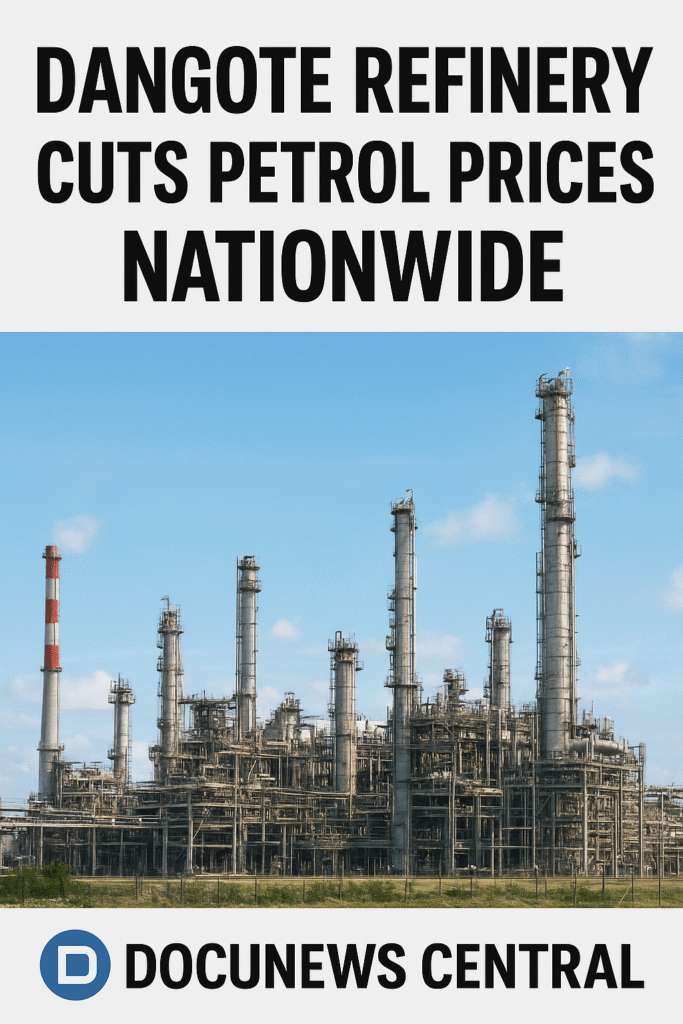
Dangote Refinery Cuts Petrol Prices Nationwide, Nigerians Welcome Relief At The Pumps
LAGOS, Nigeria — In a move that is already sending ripples across the nation’s energy market, Dangote Refinery has officially slashed the ex-depot and recommended retail price of Premium Motor Spirit (PMS) — popularly known as petrol — to a new low. This long-awaited announcement, confirmed by company officials on Friday, is being described as the most significant price adjustment since the multi-billion-dollar facility began supplying fuel earlier this year.
The decision is aimed at easing the burden of soaring transportation costs and rising inflation on Nigerian households. While the new price will not instantly appear on every pump across the country, the direct supply programme scheduled to commence September 15, 2025 is already generating excitement among motorists, commuters, and business owners.
A Landmark Reduction That Grabs National Attention
The Dangote Refinery revealed that it has reduced its ex-depot (gantry) price of petrol to ₦820 per litre, down from the previous ₦850. Alongside this adjustment, the company issued new recommended retail price templates for several states:
Lagos, Ogun, Oyo, Ondo, Osun, Ekiti: Suggested pump price of about ₦841 per litre.
Abuja, Delta, Rivers, Edo, Kwara: Suggested pump price of about ₦851 per litre.
These figures represent the first coordinated attempt by a private refinery in Nigeria to directly influence retail prices nationwide. Energy analysts say the move signals a new era in the country’s downstream oil sector, where competition — and not just government subsidies — may shape the cost of petrol.
Industry watchers quickly pointed out that the reduction is modest in naira terms but massive in symbolic value. With petrol prices having climbed dramatically in the past year, a ₦30 cut at the ex-depot level can ripple through transport fares, food prices, and small-business overheads.
Direct Supply Programme Begins September 15
To ensure that the price adjustment benefits consumers directly, Dangote is launching a “Direct PMS Supply Initiative”. Under this plan, the refinery will deliver fuel straight to participating filling stations across eleven key states.
This strategy is designed to cut out middlemen, reduce logistics costs, and discourage price speculation by marketers. According to a senior executive who briefed journalists in Lagos, the refinery will also provide free logistics support to partner stations in the initial phase of the rollout.
The targeted start date of Monday, September 15, 2025, gives marketers just days to align their distribution plans and prepare for the expected surge in demand. Already, long queues were reported at several Lagos stations as motorists sought to fill their tanks ahead of the anticipated lower prices.
Why the Price Cut Matters
For ordinary Nigerians, the reduction offers a glimmer of hope amid an economic environment that has been punishing. Over the past year, inflation has hovered around double-digit highs, with transport costs accounting for a significant share of the average household’s budget.
Commuters in urban centers like Lagos, Port Harcourt, and Abuja have seen bus fares double or even triple since fuel subsidy removal in 2023. Traders who rely on road transport to move goods have passed those costs on to consumers, driving food prices higher.
“Any relief on petrol is a relief on everything else,” said Chika Onwudiwe, a trader at Mile 12 market in Lagos. “Once transport fares come down, tomatoes, pepper, and rice will also reduce. This is what we have been praying for.”
Economic Analysts Weigh In
Economists see the refinery’s decision as both a business strategy and a national service.
Dr. Femi Ajayi, an energy economist at the University of Lagos, told DocuNews Central that Dangote’s action could reset market expectations:
“This is not just about ₦30. It is about setting a benchmark. If Dangote can sell at this price, other importers and marketers will be under pressure to match it. Competition is the key, and this is a healthy development.”
Others caution that while the ex-depot cut is significant, final pump prices will still depend on state taxes, transport costs, and individual station mark-ups.
“Consumers should understand that these are recommended prices,” said Khadijah Salisu, a downstream sector consultant. “Independent marketers may sell higher or lower depending on their supply chain. But the signal is clear: the market is moving toward lower prices.”
Government Reacts Positively
The Federal Ministry of Petroleum Resources welcomed the announcement, describing it as “a timely move that aligns with the administration’s goal of market-driven solutions.”
A spokesperson for the ministry said, “The Dangote Refinery’s initiative demonstrates how private investment can complement government reforms. We expect this to improve fuel availability and stabilize prices across the federation.”
In Abuja, lawmakers across party lines also hailed the development. Senator Abubakar Sadiq, who chairs the Senate Committee on Petroleum (Downstream), urged other players to “follow the example of Dangote and pass on cost savings to Nigerians.”
Relief for Transport Operators
For commercial transport operators, the new price template could be transformative.
“Fuel is our biggest cost,” said Ahmed Yusuf, a Lagos commercial bus driver. “If petrol goes down even by ₦20, it makes a big difference. We can reduce fares a little and still earn something.”
Transport unions, including the National Union of Road Transport Workers (NURTW), have already signaled that they will review fares once the new prices take effect.
Commuters hope that the fare adjustments will happen quickly, though history shows that transport fares often rise faster than they fall.
The Role of Direct Distribution
One of the boldest aspects of the plan is Dangote’s commitment to direct distribution to filling stations. The company plans to deploy a fleet of dedicated trucks and has promised logistics support to marketers that sign up for the scheme.
By bypassing traditional middlemen, the refinery aims to reduce the layers of profit-taking that often push pump prices far above the ex-depot rate.
“This is where the real battle will be fought,” said industry analyst Ifeanyi Okeke. “If Dangote can control distribution and keep it efficient, the pump price will reflect the ex-depot price more accurately.”
Mixed Reactions From Marketers
Not everyone is thrilled. Some independent marketers fear that direct supply could squeeze their margins.
A marketer who requested anonymity told DocuNews Central: “Dangote wants to control everything. If they start supplying directly, small marketers might struggle to compete.”
However, the Major Oil Marketers Association of Nigeria (MOMAN) issued a statement supporting the move, noting that cheaper and more stable prices would ultimately grow the market and boost sales volumes.
Nigerians Share Their Views
Across social media platforms, Nigerians expressed cautious optimism. On X (formerly Twitter), hashtags like #DangotePriceCut and #CheaperPetrol trended within hours of the announcement.
“Finally some good news. Hope the filling stations don’t spoil it,” wrote user @AdaEze.
“This is the power of competition. No subsidy, yet prices can go down,” tweeted @NaijaPolicyWatch.
On Facebook, DocuNews Central readers debated whether the price cut would last.
“It’s good, but let’s see if transporters will reduce fares,” commented Sunday Oche from Benue.
Timeline of the Dangote Refinery’s Journey
The $20 billion Dangote Refinery, located in the Lekki Free Trade Zone in Lagos, is Africa’s largest single-train refinery. Commissioned in 2024, it is designed to process 650,000 barrels of crude oil per day, producing petrol, diesel, aviation fuel, and other products.
Since beginning operations, the refinery has gradually increased output, initially focusing on diesel and aviation fuel before ramping up PMS production. The September 2025 price adjustment marks the first significant consumer-level impact of its petrol output.
Implications for Inflation and the Economy
If the lower prices hold, economists expect a modest downward pressure on Nigeria’s inflation rate, which has been driven in part by rising transport and food costs.
Lower petrol prices could also boost small and medium enterprises, which rely on generators for power amid persistent grid instability.
Financial analyst Bola Adeyemi explains:
“A sustained reduction in fuel price will lower production and transportation costs. Over time, this can slow inflation and improve purchasing power. It is a positive signal to investors that private sector players can stabilize markets.”
Challenges Ahead
Despite the enthusiasm, several challenges could slow the impact of the price cut:
Infrastructure Limitations: Nigeria’s road network and fuel logistics remain weak. Delays in distribution could create regional price disparities.
Market Speculation: Some marketers may hoard products or sell at higher prices if they sense scarcity.
Crude Oil Price Volatility: If international crude prices spike, the refinery may face pressure to adjust upward again.
Energy consultant Dr. Zainab Lawal warns:
“This is a good start, but sustaining low prices requires stable crude supply and efficient operations. Nigerians should celebrate but also stay vigilant.”
What Consumers Should Expect in the Coming Days
Consumers are advised to monitor pump prices closely once the direct supply programme kicks in. While the refinery’s recommended prices provide a guide, actual prices may vary by state and by individual filling station.
Motorists planning long trips around mid-September may wish to delay bulk purchases until the new prices fully reflect at the pumps.
In Lagos, Port Harcourt, and Abuja, some early participating stations have already signalled their intention to sell at or near the recommended rates.
Broader Significance: Private Sector Driving Change
The Dangote price cut underscores a broader trend: private investment reshaping Nigeria’s energy landscape.
With the federal government maintaining its stance on full deregulation, the refinery’s move demonstrates how market forces — not subsidies — can bring down prices when competition is strong.
“This is exactly what deregulation advocates have argued for years,” says policy analyst Tunde Ogunleye. “When private players compete, prices become more efficient. Dangote is proving that point.”
A Cautious But Hopeful Nation
For millions of Nigerians, the development offers a welcome reprieve in difficult economic times. Yet, many remain cautious, remembering that fuel prices in the country have often been unpredictable.
“Let’s enjoy the good news, but we know Nigeria,” said Lagos taxi driver Henry Eze. “Tomorrow something can change. We hope Dangote keeps the promise.” legit.com
Conclusion
The Dangote Refinery’s nationwide petrol price reduction, coupled with its innovative direct supply initiative, marks a historic turning point for Nigeria’s downstream oil sector.
While it will take days or weeks for the full effect to reach every pump, and while market forces may create variations across states, the message is unmistakable: private sector competition can deliver real benefits to ordinary Nigerians.
As the September 15 rollout date approaches, all eyes will remain on filling stations to see whether this bold initiative truly ushers in a new era of more affordable petrol — and whether it can spark a broader wave of price moderation across the economy. visit https://docunewscentral.com/
Reporting by DocuNews Central Energy Desk. Additional reporting by regional correspondents in Lagos, Abuja, and Port Harcourt.











